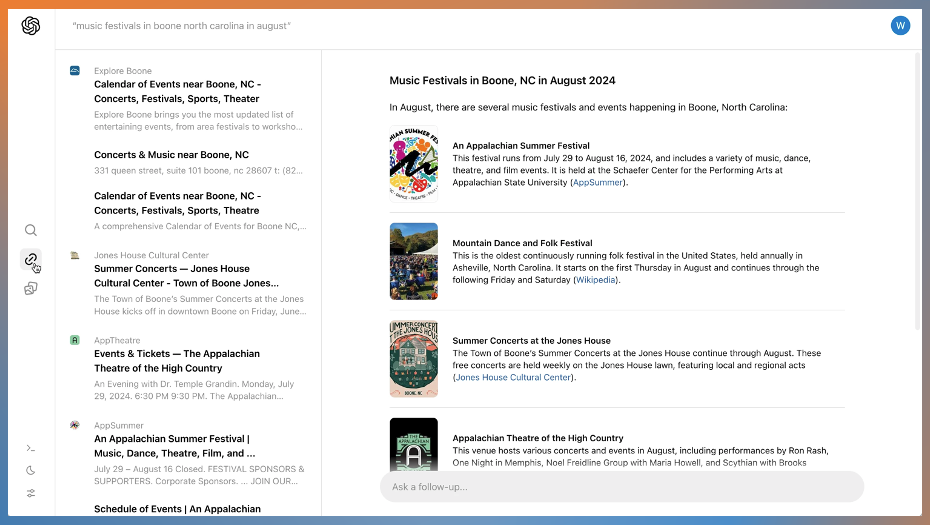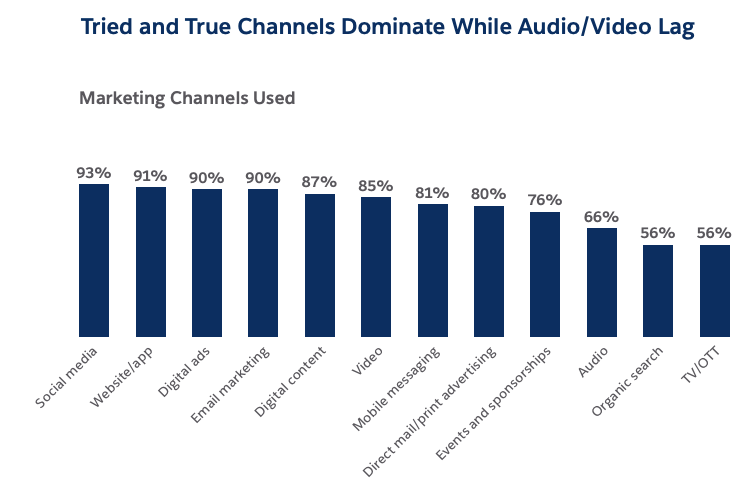The Anti-Google, Reframing SEO, Marketers Neglect SEO

SearchGPT: The Anti-Google
Right after we published the newsletter Thursday, SearchGPT was announced. This comes after months of rumors and speculation (and disappointment). However, it's only available to a small number of users and publishers for feedback. OpenAI is calling it "a prototype of new search features designed to combine the strength of our AI models with information from the web to give you fast and timely answers with clear and relevant sources." The company says that it will "integrate the best of these features directly into ChatGPT in the future." (If you haven't already, you can join the waitlist here.) The image below shows an expandable two-column format; but because it will be incorporated into ChatGPT it's not clear what it will eventually look like. One person in my LinkedIn network who has access said, "I like it a lot. I think I will be using more than Google because it provides better context along with the links." Another person remarked that it was "more of Perplexity killer than a Google killer." There are three points to make: OpenAI emphasizes how it wants to support publishers and give them more control; it emphasizes links ("clear links to relevant sources") and says it will make search more conversational, faster and easier to use.

Our take:
- In a note on "what comes next," OpenAI explicitly mentions local: "We’ll keep improving the experience in areas like local information and commerce."
- Many of the features mentioned in the blog post are not-so-subtle digs at Google, especially this: "Getting answers on the web can take a lot of effort, often requiring multiple attempts to get relevant results."
- Without access and testing there's no way to assess its potential impact. But it will have an impact; it's a question of degree.
Flipping the SEO Script
We learned from the antitrust trial (and elsewhere) that Google relies heavily on clicks and behavioral signals for search rankings. In fact, clicks may be the dominant ranking signal. In the most recent Near Media podcast, special guest Cindy Krum of Mobile Moxie introduced a simple but potentially radical reframing of SEO. She floated the idea that schema in particular make search results more appealing to end users, which results in clicks and potentially higher engagement. Google uses those signals as a proxy for high-quality content. Yet SEOs fetishized schema and other SEO tactics as intrinsically meaningful, she argues, suggesting that Google will index sites better if certain technical elements are implemented. But Cindy adds, "The real benefit of these elements, such as schema markup, lies in increasing clicks and user engagement, which is what Google prioritizes." It flips the script on SEO. Star ratings, prices, event dates and so on, make results more informative and appealing, driving clicks/engagement, which Google then responds to. Technical SEO tactics aren't meaningful per se, they help attract the attention of users – in some cases Google is better able to showcase content – and generate higher CTRs accordingly.

Our take:
- Cindy asserts that this perspective aligns SEO strategies with the goal of search engines: delivering the most relevant content to users.
- It adds new meaning and insight into Google's seemingly facile advice: just create great content for users.
- While the practical implications may not dictate different tactics, they help put things (e.g., schema) in a broader context that make them more coherent.
Marketers Neglect SEO
A 2024 report from Salesforce, grandiosely entitled The State of Marketing, finds that marketers globally are using an average of 10 channels to reach their target audiences. The survey was conducted in Q1 and involved 4,850 "marketing decision-makers" from different global regions. Social media is the dominant channel (93%) while organic search (SEO) is being used by only 56% of respondents. Paid search, though not specifically broken out is likely contained within "digital ads," used by 90% of respondents. A separate report from Ascend2 about multi-channel marketing directionally agrees with the Salesforce findings. Social is the top tactic (55%) followed by digital advertising (41%). Organic search is not mentioned though content marketing is (33%). The question here was not what do you use but “Which of the following tactics have the most impact on the success of your multi-channel strategy?” In other words: which are your most successful and impactful channels. Amazingly, marketers seem to agree that social is more improtant/effective than search.

Our take:
- Organic search is a critical marketing channel; why is it being neglected?
- One answer may be the perceived complexity of SEO and the volatility of rankings, which has seemingly become greater in the recent past.
- Social media may be seen as a more stable and predictable alternative to search. However, paid search is booming.
Recent Analysis
- Near Media podcast episode 167: Reframing how search ranking works, Google doubles down on income, voice search set for a comeback?
- Google Completes GBP Reviews for LSAs Swap in EU, by Mike Blumenthal.
Short Takes
- Experimental GBP AI tool can create a menu from an image.
- Whitespark: Adding localities to title tags can boost GBP actions.
- How Apple Maps on the web may impact Local SEO.
- Why blogging may make a comeback in the age of AI (and spam).
- After cookie reversal, W3C reiterates opposition to tracking cookies.
- AI Overviews appearing in Google Discover.
- How often does Google mix ads into organic search results?
- iOS 18.1 beta offers call recording and transcription.
- We're likely going to have to wait until 2025 for AI upgraded Siri.
- Blocking AI web scrapers has become a cat and mouse game.
- Google AI partnership with Anthropic being investigated in UK.
- WhatsApp has 100M users in US, Meta pushing to grow it more.
Listen to our latest podcast.

How can we make this better? Email us with suggestions and recommendations.

